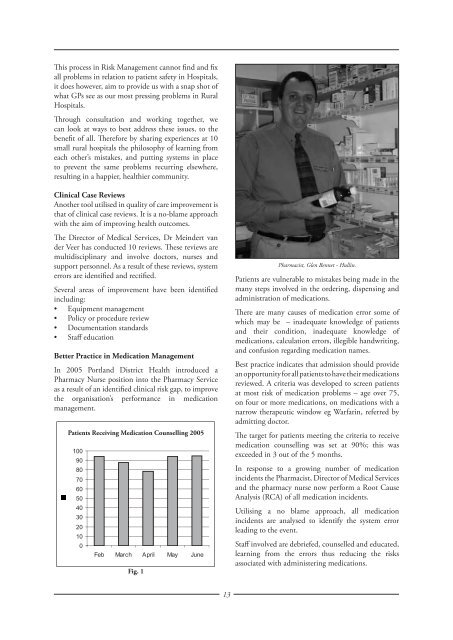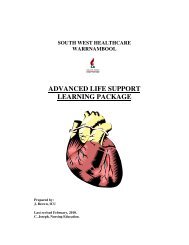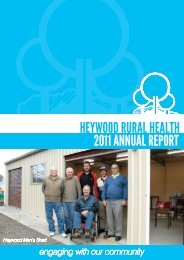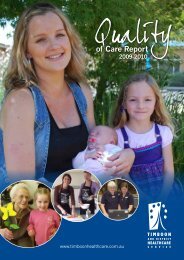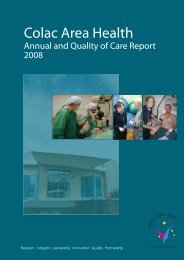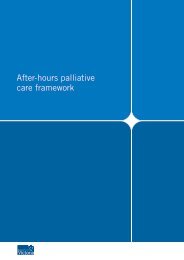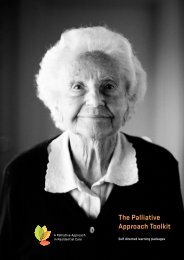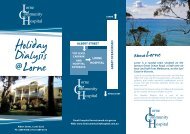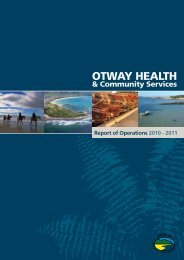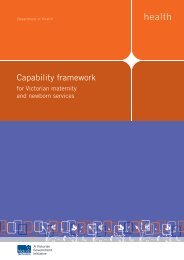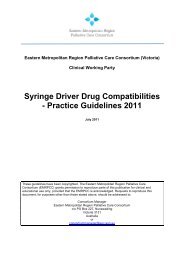Portland District Health Annual Report 2005 - South West Alliance of ...
Portland District Health Annual Report 2005 - South West Alliance of ...
Portland District Health Annual Report 2005 - South West Alliance of ...
- No tags were found...
Create successful ePaper yourself
Turn your PDF publications into a flip-book with our unique Google optimized e-Paper software.
This process in Risk Management cannot find and fixall problems in relation to patient safety in Hospitals,it does however, aim to provide us with a snap shot <strong>of</strong>what GPs see as our most pressing problems in RuralHospitals.Through consultation and working together, wecan look at ways to best address these issues, to thebenefit <strong>of</strong> all. Therefore by sharing experiences at 10small rural hospitals the philosophy <strong>of</strong> learning fromeach other’s mistakes, and putting systems in placeto prevent the same problems recurring elsewhere,resulting in a happier, healthier community.Clinical Case ReviewsAnother tool utilised in quality <strong>of</strong> care improvement isthat <strong>of</strong> clinical case reviews. It is a no-blame approachwith the aim <strong>of</strong> improving health outcomes.The Director <strong>of</strong> Medical Services, Dr Meindert vander Veer has conducted 10 reviews. These reviews aremultidisciplinary and involve doctors, nurses andsupport personnel. As a result <strong>of</strong> these reviews, systemerrors are identified and rectified.Several areas <strong>of</strong> improvement have been identifiedincluding:• Equipment management• Policy or procedure review• Documentation standards• Staff educationBetter Practice in Medication ManagementIn <strong>2005</strong> <strong>Portland</strong> <strong>District</strong> <strong>Health</strong> introduced aPharmacy Nurse position into the Pharmacy Serviceas a result <strong>of</strong> an identified clinical risk gap, to improvethe organisation’s performance in medicationmanagement.Patients Receiving Medication Counselling <strong>2005</strong>1009080706050403020100Feb March April May JuneFig. 1Pharmacist, Glen Bennet - Hullin.Patients are vulnerable to mistakes being made in themany steps involved in the ordering, dispensing andadministration <strong>of</strong> medications.There are many causes <strong>of</strong> medication error some <strong>of</strong>which may be – inadequate knowledge <strong>of</strong> patientsand their condition, inadequate knowledge <strong>of</strong>medications, calculation errors, illegible handwriting,and confusion regarding medication names.Best practice indicates that admission should providean opportunity for all patients to have their medicationsreviewed. A criteria was developed to screen patientsat most risk <strong>of</strong> medication problems – age over 75,on four or more medications, on medications with anarrow therapeutic window eg Warfarin, referred byadmitting doctor.The target for patients meeting the criteria to receivemedication counselling was set at 90%; this wasexceeded in 3 out <strong>of</strong> the 5 months.In response to a growing number <strong>of</strong> medicationincidents the Pharmacist, Director <strong>of</strong> Medical Servicesand the pharmacy nurse now perform a Root CauseAnalysis (RCA) <strong>of</strong> all medication incidents.Utilising a no blame approach, all medicationincidents are analysed to identify the system errorleading to the event.Staff involved are debriefed, counselled and educated,learning from the errors thus reducing the risksassociated with administering medications.13


